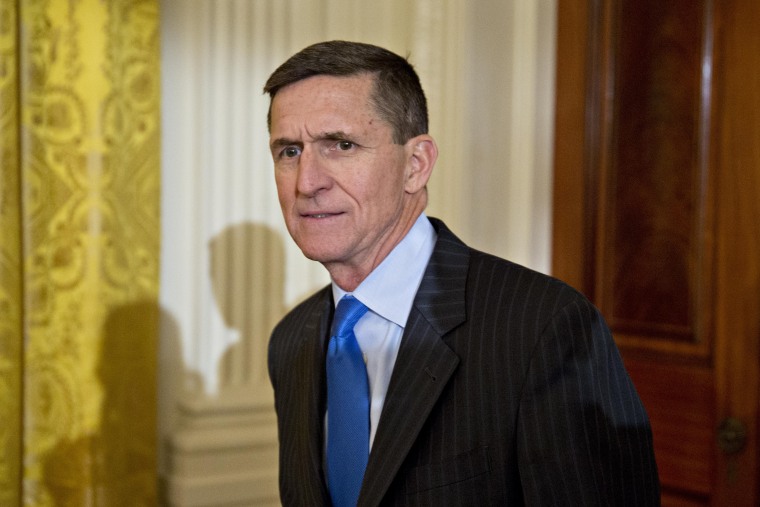The White House kept Vice President Mike Pence in the dark for weeks about the warning it had gotten about national security adviser Michael Flynn from the Justice Department, Pence's press secretary said Tuesday.
Pence did not find out until Feb. 9, according to Marc Lotter. Trump was first informed about the Justice Department's concerns regarding Flynn on Jan. 26, White House Press Secretary Sean Spicer said at Tuesday's daily press briefing.
Flynn's actions as President Donald Trump's short-lived national security adviser are under scrutiny after he resigned Monday night over phone calls he shared with Russia's ambassador to the United States in December — before Trump took office. Among the topics discussed included U.S. sanctions imposed by the Obama administration against Moscow for its alleged role in the 2016 presidential election.
The date the vice president knew is significant because it is when the administration became aware that the Washington Post was about to publish a heavily-sourced story that confirmed Flynn and the Russian ambassador discussed sanctions, despite public denials from Flynn and other incoming senior administration officials including Pence, then the vice president-elect.
Flynn's departure — so far the most high-profile of Trump's senior team — comes after the White House said he misled Pence and other senior administration officials about information he shared with Russian Ambassador Sergey Kislyak. Flynn had claimed that he had no substantial communication with Kislyak, which Pence later repeated to various news outlets.
In his resignation letter, Flynn, a retired Army lieutenant general, said "the fast pace of events" was to blame for his inadvertently briefing Pence and others with "incomplete information regarding my phone calls with the Russian ambassador."
Related: A Timeline of Mike Flynn's Rise and Fall and the Russia Call
The Washington Post reported Monday that the Justice Department, led by then-Acting Attorney General Sally Yates, informed the White House last month that Flynn was not entirely forthcoming about the calls or their substance — opening him up to the possibility of blackmail by the Kremlin.
Yates also reportedly was concerned that Flynn could have violated the Logan Act of 1799, a rarely used law that bars unauthorized U.S. citizens from negotiating with foreign governments. However, a senior intelligence official told NBC News last week that there had been no finding that Flynn acted illegally.
Trump fired Yates on Jan. 30 after she directed Justice Department lawyers not to defend the president's executive order on immigration.
Flynn's calls with the Russian ambassador were leaked in a Jan. 12 op-ed in The Post.
Spicer said Tuesday the White House counsel undertook an "exhaustive review" and determined that Flynn hadn't violated any laws, but he still weighed whether Flynn could remain effective.
"We got to a point not based on a legal issue, but based on a trust issue, with the level of trust between the president and General Flynn had eroded to a point where [Trump] felt he had to make a change," Spicer said. "The president was very concerned that General Flynn had misled the vice president and others."
Trump counselor Kellyanne Conway also tried to distance the administration from Flynn on Tuesday morning, saying on TODAY that he was at fault after providing incomplete information and not being able to recall what occurred on his phone calls.
She was pressed repeatedly on why Flynn was left in his post — and continued to retain the president's trust — even after the Justice Department sounded an alarm.
"That's one characterization," Conway said. "But the fact is that General Flynn continued in that position and was in the presidential daily briefings, was part of the leader calls as recently as [Monday] … and as time wore on, obviously the situation had become unsustainable."
Flynn has been replaced by retired Army Lt. Gen. Keith Kellogg as acting national security adviser.
Editor's note: The original version of this story said the Trump administration knew about the DOJ warning on Flynn for 11 days before Pence learned of it. It is 15 days.


